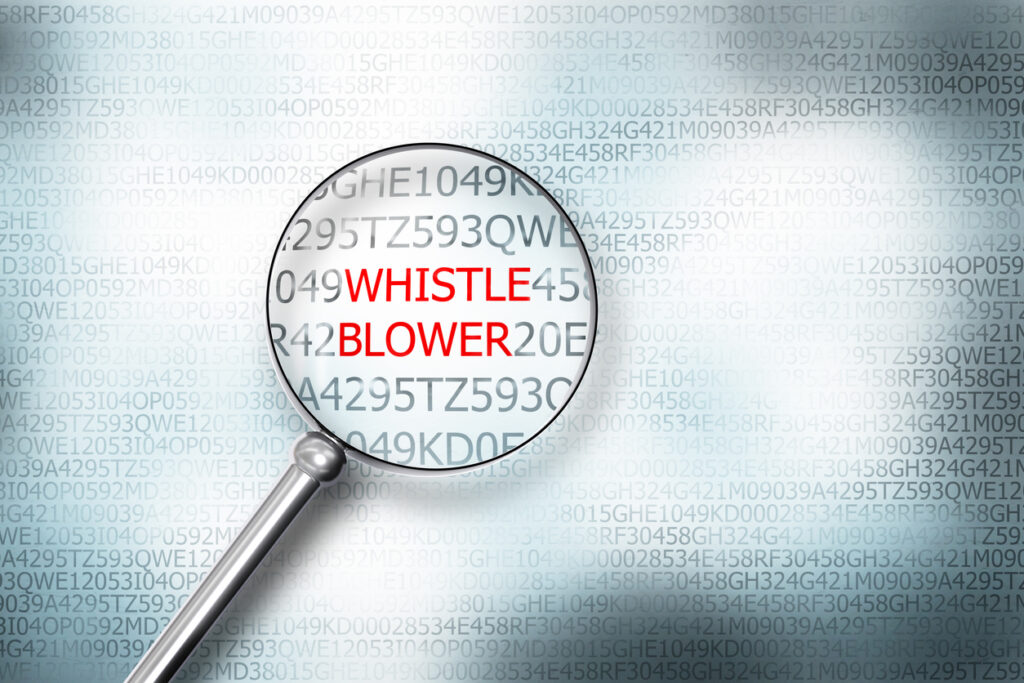In corporate governance and ethical practices, whistleblowers play a crucial role in upholding integrity and transparency. However, not all whistleblowers are created equal. There are distinct differences between public and private whistleblowers, each with unique challenges and protections. As Bob Goodman, partner at Parrish and Goodman, specializes in handling cases for public and private whistleblowers, we aim to shed light on these differences and their implications.
What is a Whistleblower?
A whistleblower is an individual who exposes information or activities within an organization that are deemed illegal, unethical, or incorrect. Whistleblowers can work in various sectors, and depending on their employment context, they are categorized as either public or private whistleblowers.
Public Whistleblowers
Public whistleblowers work for local, state, or federal government entities. They come forward with information about improper or illegal practices within governmental agencies. Public whistleblowers play a vital role in ensuring governmental transparency and accountability.
Notable Example: Edward Snowden
One of the most prominent public whistleblowers is a former National Security Agency (NSA) employee, Edward Snowden. Snowden disclosed extensive surveillance programs conducted on U.S. citizens without their knowledge, sparking a national debate on privacy versus security. His revelations highlighted the delicate balance between individual privacy and the need for governmental oversight.
Private Whistleblowers
Private whistleblowers, on the other hand, are employees within the private sector. They could work for companies in manufacturing, healthcare, finance, etc. These whistleblowers often expose product defects, financial fraud, or unethical business practices.
Notable Example: Sherron Watkins
Sherron Watkins, an executive at Enron, reported various accounting irregularities before the company’s infamous collapse. Despite her efforts, her concerns were initially ignored. The subsequent downfall of Enron became one of the biggest accounting frauds in history, leading to significant financial losses and the destruction of one of the largest accounting firms in the country. This case underscores the importance of taking whistleblower claims seriously to prevent corporate disasters.
Key Differences Between Public and Private Whistleblowers
Statute of Limitations
One of the biggest differences between public and private whistleblowers is the statute of limitations. In many states, the timeframe for public whistleblowers to come forward is much shorter compared to those in the private sector. This requires public whistleblowers to act quickly to ensure their claims are heard and investigated.
Legal Protections and Compensation
Both public and private whistleblowers are protected by laws designed to prevent retaliation and termination for doing the right thing. For instance, the Sarbanes-Oxley Act was enacted after the Enron scandal to outlaw certain unethical accounting practices and to enhance protections for private sector whistleblowers. These laws ensure that whistleblowers can report misconduct without fear of losing their jobs and may even be entitled to compensation for their bravery.
Balancing Privacy and Security
The cases of Edward Snowden and Sherron Watkins highlight a fundamental dilemma: where do we draw the line between privacy and security or between ethical business practices and profitability? Both public and private whistleblowers force us to confront these questions and strive for a balance that protects individuals while upholding ethical standards.
The Importance of Legal Guidance
Navigating the legal landscape of whistleblowing can be complex and daunting. It is a legal minefield, and stepping carefully is crucial. Whether you are a public or private whistleblower, having experienced legal guidance is essential to ensure your rights are protected and that you can make your disclosures safely.
Schedule Your Consultation Today
Whistleblowers, whether in the public or private sector, are vital to maintaining ethical standards and transparency in both government and corporate environments. The protections in place are designed to support those who come forward to expose wrongdoing while safeguarding them from retaliation.
If you or someone you know may be a potential whistleblower, it is important to understand your rights and the legal protections available to you. At Parrish and Goodman, we specialize in guiding whistleblowers through this challenging process, ensuring they can make their disclosures safely and effectively.
For more information or to discuss a potential case, please contact us to schedule a no-risk, no-obligation consultation. Your courage in standing up for what is right can make a significant difference.




